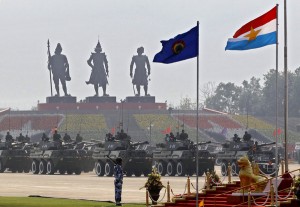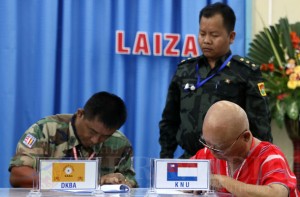Posts Tagged ‘Burma Army’ (238 found)
Ongoing Sexual Violence in Burma Requires International Investigation
Burma Campaign UK today publishes a new Briefing Paper – Rape and Sexual Violence by the Burmese Army – which details how the Burmese Army has used rape and sexual violence with impunity for decades, and reports of rape and sexual violence have continued since Thein Sein became President and reforms began. Burma Campaign UK is calling for an international investigation to be established, as it is clear that President Thein Sein and the Burmese Army are unwilling to address this issue, and the international community cannot allow these abuses to continue […]
• • •Rape and Sexual Violence by the Burmese Army
This briefing details how the Burmese Army has used rape and sexual violence with impunity for decades. Reports of rape and sexual violence have continued since Thein Sein became President and reforms began. Burma Campaign UK is calling for an international investigation to be established, as it is clear that President Thein Sein and the Burmese Army are unwilling to address this issue […]
• • •Burma Army Soldiers Beat, Stab and Rob Villager in Northern Shan State
A villager distributing invitations to his son’s ordination ceremony was beaten, stabbed and robbed by Burma Army troops of LIB 515 in Tang Yan Township, northern Shan State on 23rd March 2014 […]
• • •Spreading Burma Army Attacks and Abuses Against Civilians in Shan State Undermine Nationwide Ceasefire Negotiation
The Shan Human Rights Foundation is deeply concerned at the escalation of attacks and abuses by the Burma Army against civilians in different areas of Shan State during March 2014, which are undermining current negotiations for a nationwide ceasefire […]
• • •Conflict-related Sexual Violence: Report of the Secretary-General
The present report, which covers the period from January to December 2013, is submitted pursuant to paragraph 22 of Security Council resolution 2106 (2013) , in which the Council requested me to submit annual reports on the implementation of resolutions 1820 (2008) , 1888 (2009) , 1960 (2010) and 2106 (2013) with regard to conflict […]
• • •The Burma Army and Its Language of Aggression
 Mixed messages on the peace process came out this week as the government proposed for the first time to commit a substantial amount of money into the peace process. Yet the Commander-in-Chief of the Armed Forces Senior General Min Aung Hlaing’s inflammatory comments on the indestructibility of the Burma Army and blaming the conflict on the country’s ethnic armed groups expose the attitudes of the country’s most powerful institution. Meanwhile, a second round of formal talks between ethnic armed groups and the government’s Union Peace Working Committee on the nationwide ceasefire accord have been postponed until February as ethnic representatives further discuss the accord.
Mixed messages on the peace process came out this week as the government proposed for the first time to commit a substantial amount of money into the peace process. Yet the Commander-in-Chief of the Armed Forces Senior General Min Aung Hlaing’s inflammatory comments on the indestructibility of the Burma Army and blaming the conflict on the country’s ethnic armed groups expose the attitudes of the country’s most powerful institution. Meanwhile, a second round of formal talks between ethnic armed groups and the government’s Union Peace Working Committee on the nationwide ceasefire accord have been postponed until February as ethnic representatives further discuss the accord.
A local newspaper, True News, published comments made by Senior General Min Aung Hlaing at a briefing to officers in Naypyidaw in November 2013. The language of peace and reconciliation was conspicuously absent in his address, “We made peace agreements, but that doesn’t mean we are afraid to fight. We are afraid of no one. There is no insurgent group we cannot fight or dare not to fight.” The Burma Army chief also states that he intends to follow the path laid down by Senior General Than Shwe, the former head of the military junta that suffocated and terrorized Burma from 1988 to 2011. Burma’s underdevelopment, he adds, is “because of internal insurgents who caused conflict in the country.” […]
13-19 January: The Burma Army and Its Language of Aggression
The full text of this week’s issue of Weekly Highlights, including an analysis of current events and news highlights from inside Burma, the region and internationally, as well opinion pieces, actions, statements, press releases and reports from Burma groups and relevant actors.
• •Villagers in Eastern Shan State Suffer Forced Labour and Extortion by Burma Army Troops Guarding Loggers in Salween Dam Flood Zone
Villagers in Murng Paeng township are being used as forced labour by Burmese government troops giving security to military-linked logging operations above the planned Ta Sang dam on the Salween River. The loggers are clearing out teak forests from the projected flood zone for export to neighbouring countries […]
• • •Nationwide Ceasefire Accord: Not the End Game
 At a historic summit in Laiza, Kachin State, 17 ethnic non-state armed groups agreed to sign the government proposed nationwide ceasefire accord on condition that political dialogue will follow. Of the armed groups who attended this conference, the Restoration Council for Shan State (RCSS) were the only group not to sign, stating that they wanted to consult with Shan political parties and civil society before agreeing.
At a historic summit in Laiza, Kachin State, 17 ethnic non-state armed groups agreed to sign the government proposed nationwide ceasefire accord on condition that political dialogue will follow. Of the armed groups who attended this conference, the Restoration Council for Shan State (RCSS) were the only group not to sign, stating that they wanted to consult with Shan political parties and civil society before agreeing.
A 13-member committee has been formed that will lead negotiations with government minister Aung Min’s peace team in Myitkyina, the capital of Kachin State, starting on 4 November. The conditions to be negotiated with Aung Min include a guarantee that comprehensive political dialogue will be held early next year that will address the role of the Burma Army and greater autonomy for Burma’s ethnic nationalities, something for which they have been fighting for decades.
The 3-day summit was held in Laiza, a town in Kachin Independence Organization (KIO) held territory. Ethnic leaders were greeted by hundreds of supporters on the streets of the town, cheering and singing songs as various leaders arrived. It is of no surprise that ethnic armed groups garner this kind of support. As the summit was being held, Burma Army forces attacked villages in southern Kachin State, displacing around 2,000 people and causing one woman, who was already in bad health, to die while she was sheltering in a church. Burma Army soldiers reportedly opened fire as they entered the five villages under attack […]
Burmese Government Troops Use Villagers as Human Shields After Attacks Against Ceasefire Group in Central Shan State
On October 13, 2013, Burmese government troops forced 18 villagers to walk between them as human shields while returning to their base, after attacking a Shan ceasefire group in Kunhing, close to the Salween River, in central Shan State.
About 80 Burmese troops from Light Infantry Battalion 150, based at Mong Zarng, 30 miles north of Kunhing, had attacked the Shan State Army-South during October 10 to 12, firing mortar shells and causing over 100 people from the village of Paeng Ner, southeast of Kunhing, to flee their homes […]
• • •








 All posts
All posts